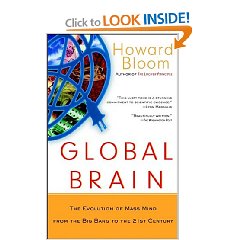
5 out of 5 Stars
Live and Let Die Group Dynamics, Bacteria Are Winning
July 13, 2001
Very very few books actually need to be read word for word, beginning with the bibliography and ending with the footnotes. This is one of those books. While there are some giant leaps of faith and unexplained challenges to the author's central premises (e.g. after an entire chapter on why Athenian diversity was superior to Spartan selection, the catastophic loss of Athens to Sparta in 404 BC receives one sentence), this is a deep book whose detail requires careful absorbtion.
I like this book and recommend it to everyone concerned with day to day thinking and information operations. I like it because it off-sets the current fascination with the world-wide web and electronic connectivity, and provides a historical and biologically based foundation for thinking about what Kevin Kelly and Stuart Brand set forth in the 1970's through the 1990's: the rise of neo-biological civilization and the concepts of co-evolution.
There are a number of vital observations that are relevant to how we organize ourselves and how we treat diversity. Among these:
1)The five major elements of global inter-species and inter-group network intelligence are the conformity enforcers; the diversity generators; the inner-judges; resource shifters; and inter-group tournaments. You have to read the book to appreciate the breadth and value of how these work within all species from bacteria to homo sapiens.
2) Bacteria have extraordinary strategies for rapid-fire external information collection and exchange, quick-paced inventiveness, and global data sharing. Species higher up on the evolutionary scale do not always retain these capabilities–they internalize capabilities while losing organic connectivity to others.
3) Imitative learning, while beneficial in general, can be extremely hazardous to inventiveness and adaptation. This ties in with his wonderful discussion of reality as a shared hallucination–fully one half of a person's brain cells are killed off by culturally-driven framing.
4) Non-conformists–diversity generators–are absolutely vital to the survival of any species because they are “option generators”–but too often those in power (e.g. a corporate presidency that thinks it knows all it needs to know) will shut out and even ruin the very non-conformists it most needs to adapt to external challenges it does not understand.
5) Labor theories of productivity that exclude calculation of the time and enegy spent on information exchange are out-moded and counter-productive. In this the author is greatly reinforced by Paul Strassmann's many books on Knowledge Capital (TM) and information productivity–we have the wrong metrics for evaluating individual information productivity, something Alan Greenspan saw early, but we also have the wrong metrics for evaluting *group* information productivity, something most have not figured out yet: it is called the “virtual intelligence community” or the “world brain”, and that is the next information revoluton.
6) World War III is here now, and it is an inter-species group tournament in which we are losing because we are not collecting and exchanging vital information fast enough. The rampant continent-wide diseases (not just AIDS but the square of AIDS, malaria-anemia, tuberculosis, and hepatitis, best described by Robert D. Kaplan's works as well as Laurie Garrett) and the antibiotic-resistant (and freezer resistant) strains of toxic disease and disease carriers will kill most of us much sooner than a gun in the hands of a fellow man….unless we figure out that early warning, global coverage, and rapid response non-military surge intervention is vital to our survival.
7) Language as well as culture are killers of thought. The author is compelling and fascinating as he discusses this in detail, comparing different language-cultural “toolkits” for concepts like the environment, alternative food sources, discipline options, and so on.
8) The author, who clearly has suffered some himself from being excluded or not taken seriously, is careful to discuss both the positive and the negative aspects of the “conformity police”–the conclusion I draw from his overall discussion is that we are seriously at risk, as humans in general but as Anglo-Saxons in particular, because the conformity police control all the resources (including National Science Foundation grants) and the iconoclasts are being shunned and starved.
9)The chapters on the kidnapping of the mass mind and how reality is a shared group hallucination draw ably on earlier works such as “The Social Construction of Reality”. The author excels at discussing how a very small number of people–25,000 in the case of Hitler's takeover of Germany–can combine cultural conformity traits with a little terror and corruption to dominate much larger groups of otherwise intelligent beings.
10) Internal processing matters more than external collection. I found this fascinating. Kevin Kelly and Stuart Brand and others have led the way in earlier decades, but the author does a great job of pointing out how an effective learning machine has far more internal connections than external windows, and that in a “hive mind” what you do with what you know individually–in terms of sharing with others–is vastly more important than how much you as a single individual might know.
I am not as upbeat as other reviewers about how this book suggests endless possibilities for a return to the perfect earth and inter-galactic migration. If anything, I am fairly concerned that the bacteria will win this war and that it will be another human species, billions of years from today, that may finally get it right. While we know everything we need to know to radically alter the manner in which we collect, process, and share information, our political conformity police and our economic robber barons are intent on keeping us stupid as a people in this generation. Nothing stands between us and Howard Bloom's vision for bio-diverse salvation but our own inherent timidity, rigidity, and inertness–we are chained by old ideas and loath to explore new ones. We prefer death by habit to life by choice. This is very scary stuff–this is a *great* book.




